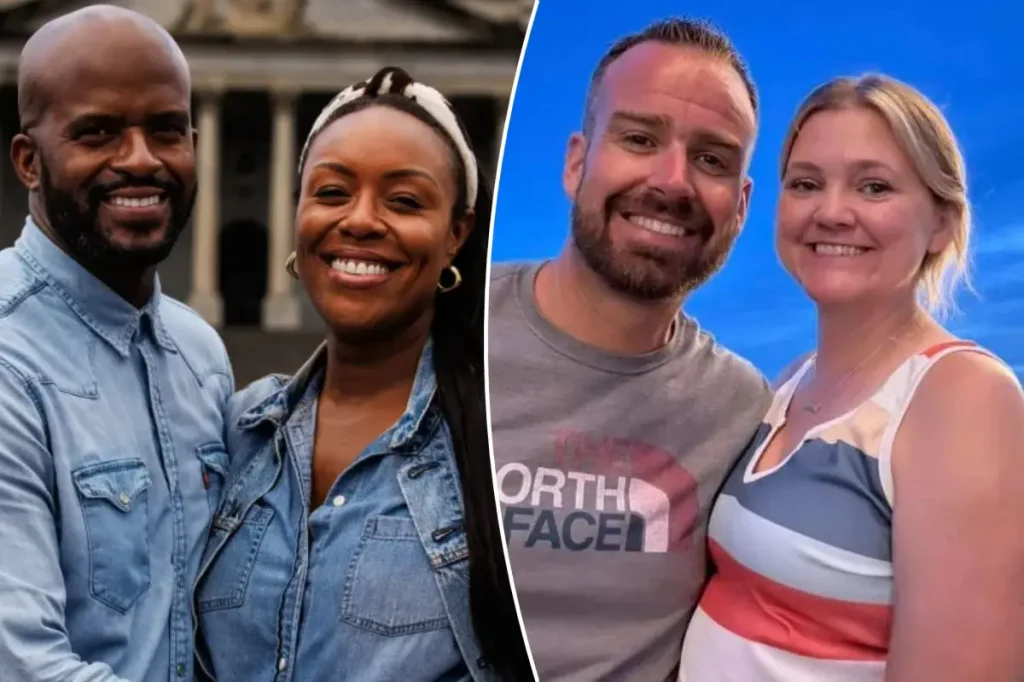Finding Love Across the Political Divide
In an era of intense political polarization, where government shutdowns and partisan bickering dominate headlines, some couples are defying the odds by maintaining loving relationships despite opposing political affiliations. These rare “mixed” marriages—becoming increasingly scarce in America—offer valuable lessons in communication, empathy, and finding common ground that even our gridlocked Congress might learn from.
Two such couples shared their stories with The Post, revealing how they navigate the complex terrain of love in politically divided times. Samantha and Andy Miller from St. Louis represent one such union. “I’m a Democrat who completely opposes Trump and his agenda, so I know it sounds crazy that I’m married to a Republican,” admits 38-year-old Samantha about her relationship with Andy, 42, a Trump supporter. Meanwhile, in Washington D.C.—the very epicenter of partisan politics—attorneys Sydney Bradford and Drew Benbow have found love despite their Democratic-Republican divide. These couples aren’t just surviving their political differences; in many ways, they’re thriving because of them. The 2017 Institute for Family Studies reported that only 4.5% of American marriages consisted of opposing political parties, dropping to 3.6% by 2020. If this trend continues, fewer than 2% of marriages nationwide will span the partisan divide by 2025, making these relationships increasingly exceptional.
Sydney and Drew’s story began at Hampton University in Virginia twenty years ago when both identified as Democrats. After losing touch, they reconnected through social media when Sydney discovered Drew had written a novel called “The Devil’s Politics.” During their reunion, Sydney noticed Drew’s political views had shifted rightward, but by then, they had already formed a deeper connection. “The fiber of who he was hadn’t changed,” Sydney explained. Drew attributes his political evolution to personal reflection: “When I really started to think about my personal views, I realized that they are more conservative and more aligned with the Republican Party.” Their legal backgrounds have equipped them with skills perfect for navigating political disagreements—analytical thinking, curiosity, and an appreciation for nuance. “You can’t take a hatchet; you have to use a scalpel,” Drew says, explaining that most Americans have complex political beliefs that don’t fit neatly into partisan boxes. They’ve discovered surprising common ground when discussing issues in detail, finding that political ideology is rarely as binary as it seems on the surface.
The Millers have been “inseparable” since 2009, despite approaching politics from fundamentally different perspectives. Andy votes with what he considers his family’s interests in mind, favoring policies he believes promote safety, strong borders, and economic prosperity. Samantha describes herself as “an empath” who “wants to do what’s best for everyone,” supporting universal healthcare and gun reform while opposing ICE deportations. Their political differences intensified during the 2016 election when politics became part of daily conversation, leading to “passionate” arguments during the 2024 campaign. Unlike Sydney and Drew, who embrace political debate, the Millers have learned when to engage and when to hold their tongues. “There are times when we won’t speak about it,” Samantha admits. “We just know. I’m very, very strong-minded in my opinions. He’s very strong-minded in his.” This selective engagement allows them to maintain harmony while acknowledging their ideological differences.
Both couples emphasize that political disagreements have strengthened their relationships in unexpected ways. The necessity of carefully navigating controversial topics has made them better communicators overall, developing skills that benefit every aspect of their relationships. They’ve learned to approach disagreements with curiosity rather than judgment, seeking to understand rather than convert each other. Therapist Lesley Koeppel confirms this phenomenon: “Political differences do not automatically mean relationship incompatibility. What often matters more is how a person holds their own beliefs and whether they can tolerate complexity, differences, listen respectfully, and approach these differences with curiosity.” The Millers note that their political differences force them to focus on the qualities they admire in each other—like Andy’s excellence as a father—rather than taking such attributes for granted. “It just makes up one part of you, but I don’t think it defines you,” Samantha says of political affiliation. Andy adds, “We were together a while before all the craziness started with politics, and the relationship wasn’t built on that.”
In a deeply divided nation where political identity increasingly determines everything from where people live to whom they associate with, these couples represent a rare bridge across America’s widening partisan chasm. Sydney and Drew recently closed a D.C. bar called Political Pattie’s but hope to revive it as a SuperPAC promoting political civility. They believe their experiences offer valuable lessons for a fractured country, especially during times of governmental dysfunction. “Democrats and Republicans need to be able to sit at the same table,” Sydney declares. “To see the humanity in another person, even if they have a very different view than yours, has never been more important.” Both couples acknowledge feeling that their mixed relationships are considered “taboo” in today’s polarized climate, but they’re speaking out to encourage others to reach across the aisle, challenge assumptions, and perhaps even find love where they least expect it. Their stories remind us that beneath our political identities lies our common humanity—a lesson that might serve both romantic partners and politicians alike.


